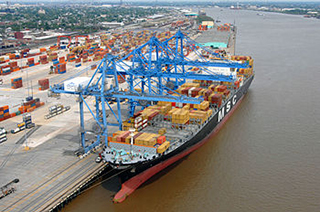A recent item from Virginia public-policy think tank the Lexington Institute defends the Jones Act as a critical piece of the United States homeland security infrastructure.
The article, written by defense analyst Daniel Gouré, Ph.D., points to the Jones Act’s “most obvious [objective] to support a robust U.S. shipbuilding industry and merchant marine” by restricting a significant amount of traffic between U.S. ports to vessels built in the U.S. owned by U.S. citizens, and crewed largely by U.S. citizens.
Gouré, pointing to major coastal U.S. cities with ports that provide access to the extensive U.S. river system, refers to the act’s role in homeland security as “less well-appreciated but ever more important.”
“It is particularly important that those vessels and crews which routinely travel between U.S. ports and especially the inland waterways through America’s heartland pose no threat to the homeland,” Gouré wrote. “It is for this reason that the higher standards with respect to ownership and manning requirements for Jones Act ships are so significant.”
As the effort to secure U.S. seaports and foreign cargoes is great to begin with, Gouré says that “it makes no sense to add to the burden facing domestic security agencies by allowing foreign-owned ships operated by foreign crews to move freely throughout America’s inland lakes, rivers and waterways.”
The crux of Gouré’s argument is about reducing risk, and he writes that the act provides a self-policing mechanism “that reduces the requirement for law enforcement and homeland security organizations to expend time and effort to ensure that these vessels and crews are safe to traverse U.S. waters.”
In its mission statement, the Lexington Institute lists the organization’s goal as “to inform, educate, and shape the public debate of national priorities in those areas that are of surpassing importance to the future success of democracy.” National security and defense get a special mention: “By promoting America’s ability to project power around the globe we not only defend the homeland of democracy, but also sustain the international stability in which other free-market democracies can thrive.”
A 2010 article (subscription) written by Ken Silverstein and published in Harper’s Bazaar questioned the Lexington Institute’s objectivity, pointing to the group’s ties to defense contractors.





